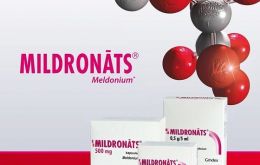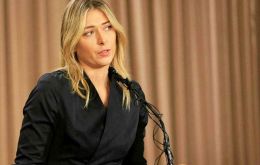MercoPress. South Atlantic News Agency
Tag: World Anti-Doping Agency - WADA
-
Wednesday, December 6th 2017 - 08:44 UTC
Russia banned from Winter Olympics: “systematic manipulation” of the anti doping system

Russia has been banned from the 2018 Pyeongchang Winter Olympics after the IOC found evidence of an “unprecedented systematic manipulation” of the anti-doping system that has led to a series of suspensions for the country’s athletes in recent months.
-
Monday, June 27th 2016 - 07:04 UTC
Anti-Doping agency suspends testing laboratory in Rio for coming Olympics

The World Anti-Doping Agency (WADA) has suspended the credentials of a testing laboratory in Rio de Janeiro that didn’t conform with international standards, just over a month before the city hosts the Olympic Games.
-
Wednesday, March 9th 2016 - 06:19 UTC
Mildronate (meldonium), a heart medication popular in Eastern Europe and..athletes

When Maria Sharapova announced Monday that she had failed a drug test at the Australian Open by testing positive for the banned drug meldonium, it prompted many questions about what this substance is and how it affects an athlete's performance.
-
Wednesday, March 9th 2016 - 06:02 UTC
Sharapova, the highest/paid female athlete in the world, loses major sponsors

Tennis star Maria Sharapova has lost several major sponsors after admitting that she failed a drug test at the Australian Open. The former world champion has been the highest-paid female athlete in the world for 11 years in a row, Forbes reported last year. She earned US$29.7 million last year — including “US$23 million from endorsements and appearances,” according to Forbes.
-
Thursday, November 19th 2015 - 07:04 UTC
World Anti-Doping agency includes Argentina, Bolivia and Ukraine in its non-complaint code list

The World Anti-Doping Agency’s Foundation Board has unanimously voted to declare the national anti-doping agency for Russia, Andorra, Israel, Argentina, Bolivia and Ukraine non-compliant with its code.
-
Tuesday, July 8th 2014 - 07:44 UTC
World Cup cleared of doping after more than 1.000 negative tests

Every player tested for drugs at the World Cup in Brazil has been cleared of doping after more than 1,000 tests came back negative, FIFA's medical committee announced on Monday.
-
Friday, September 20th 2013 - 07:30 UTC
Brazil with no labs to handle drug testing for the 2014 World Cup

With one lab suspended and its replacement unfinished, Brazil won't be able to handle drug testing for the 2014 World Cup alone and is looking overseas for help. The executive director of the country's anti-doping authority said the new lab in Rio de Janeiro should be running a year before the 2016 Olympics. But, Marco Aurelio Klein added, the lab won't be ready for the World Cup next June and July.
